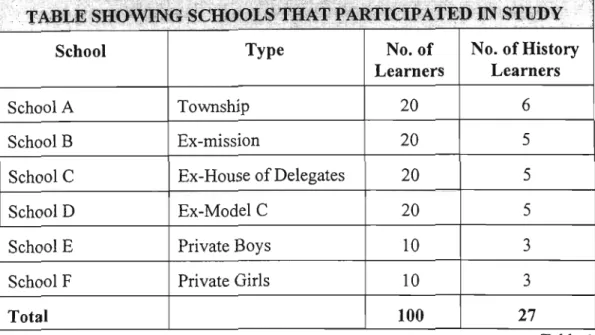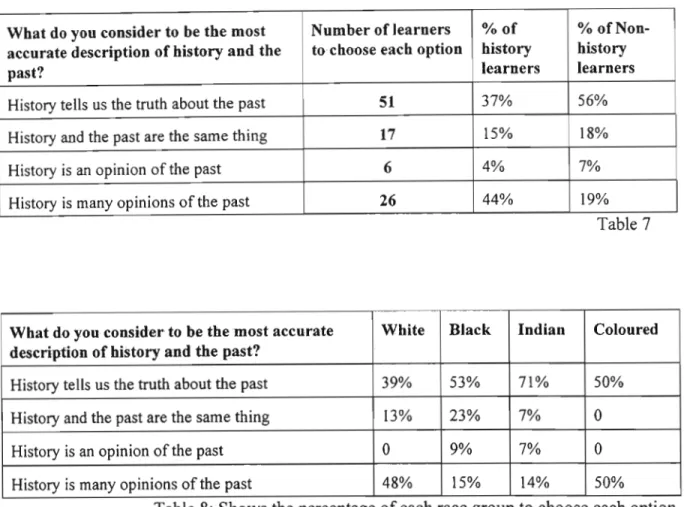This study investigates attitudes towards school history and a 'sense of the past' among a sample of Year 12 students in a selection of six schools in the Durban area. All over the world they tend to work in the service of the dominant classes and groups in society. But to what extent does it shape and influence the student's feelings about the past and attitude towards history.
They also explore some of the external influences that shape the way children think about and negotiate the past in everyday life. South Africa', was carried out by a number of history and education researchers from the University of the Witwatersrand. The majority of participants in this study were born in the late 1980s (see point two above).
These sections focus on my second aim: to explore students' feelings about the past (which will be discussed in Chapter Six) rather than to assess students' attitudes toward history as a school subject (which will be discussed in Chapter Five being discussed). All schools participating in the study naturally offered history as a subject at Matric level. Ninety-four of the students involved in the study indicated that they planned to continue their studies after school.
Many of the non-history learners who said they did not also enjoy history. This will probably be a particularly sore point for some of the learners given the strongly political nature of school history in the past in South Africa. Eighty-nine percent of the learners involved in the study thought that children should learn history at school.

Reasons why history learners chose history
On the other hand, three history learners said that their parents or carers advised them to take history and one said that their teacher advised them to take history. One particularly enthusiastic learner said that she chose to study history up to Matric level because 'history is my favorite subject' (Q71). Non-history learners tended to give the reason '1 like history, but I think that the subjects 1 have chosen will be more worthwhile'.
Fifty-five percent of non-history students chose this option, including 43% of those non-history students who said they did not like history. Thus, 43% of non-history students who said they did not enjoy 10a history in question chose the option that included the phrase '1like history'. Perhaps these students chose this option because there was no option that simply stated "I think the subjects I chose will be worth more".
Thirty-four percent of non-history learners chose the options: 'history is boring' or 'I'm not interested in the past'. While 16% chose the option "what happened in the past is over, I don't need to learn about the past anymore". These learners were a mix of non-history learners (both those who enjoyed history and those who did not) who found the past painful or found the content of the history syllabus irrelevant.
In many cases, the choice of subject appears to have been between history, geography and accountancy, and as geography and accountancy are subjects considered to have fairly stable career prospects, it is not surprising that they were the preferred choice. Twenty-three percent of non-history majors felt that history required too much study, and some were discouraged because they found the subject difficult or did not do well. Sixteen percent of those who do not study history 'do not see the value of the skills that history teaches'.
Ten percent said that they had discouraged them from taking history as a subject until Matric.
Reasons why non-history learners chose not to study history
The study reveals that slightly more than half of the participants have a favorable attitude towards school history. One of the purposes of the questionnaire was to try to determine students' interpretations of three key terms on which this study is based: 'history', 'historian' and 'the past'. Four of the questions in the questionnaire attempted to gain a general understanding of how students understand, think about and distinguish (if at all) the concepts of 'history' and 'the past'.
Although some students indicated in their responses to the questions discussed above that they thought history was about great or important people and events, 87% of them also thought they were part of history (Question 6). Two-thirds of the group who thought they were not part of history were women. Fifty-one percent of students chose the option “History tells us the truth about the past” (see Table 7).
Another 23% of black students chose the option "History and the past are the same." Ninety percent of history students who chose this first option were black, Indian or colored. Forty-eight percent of white participants thought that 'History is too much of the past'.
Eighty-nine percent of students indicated that they talked to their parents/guardians about the past. One boy explained that he did not talk to his parents about the past because 'they are not educated. As a result, many parents of black students find it too painful to talk about the past, or else the students avoid the subject to avoid upsetting their parents.
However, many of the answers to the question posed above corresponded better to the question: What do you feel when you think about the past. The views of some of the students were then probed more deeply during the interviews. It also helped to draw parallels between students' attitudes towards school history and their wider feelings about the past.

Learners' Attitudes towards South Africa's Past
The students who said it would be better to simply forget the past tended to be black students with no history who did not enjoy history. A girl said it would be better to forget the past because we are busy. One male student wrote: 'Because people find it hard to move on because they are still stuck in the past.
A few students said that we needed to forget the past because it was painful. A quarter of the students were unsure of the value of simply forgetting the past. How successful were the questionnaire and semi-structured interview as research tools designed to elicit a clearer understanding of students' 'senses of the past'?
I have found both the questionnaires and the transcribed interviews to be useful resources when trying to gain a clearer understanding of learners' senses of the past. These distinctions point to the need for more focused questions in the future that can more directly examine learners' 'compartmentalisation' of the past. Using this information, I hoped to be able to draw some preliminary conclusions about the extent to which learners' senses of the past and attitudes to history were shaped and.
The findings are exploratory, but they do suggest that further research into students' attitudes towards school history and adolescents' 'feelings of the past' could be of value to history education authorities thinking about the future of history in South African schools. To what extent are students' feelings about the past and their attitudes toward history shaped and influenced by the socializing forces of history education at school? In other words, students' attitudes toward school history were in many cases representative of their own past senses in some way.
These students felt empowered by black liberation and were inclined to believe that we should learn from the past and look to the future. This frustration may be a sign of a younger generation that does not want to be burdened with the burden of the past. In this regard, white students appeared to be the group most dissatisfied with the past.
APPENDICES
History tells us history and the past History is a story is the very truth about the past. are the same thing. past opinion. past opinions. Can you see how the story you were taught in school affects your life? Do you think you are a part of History? (Check the most appropriate box) Yes.
If you are taking History as a Matric subject, please indicate whether you are studying History at Higher (HO) or Standard Degree (SO). My history teachers really like/d that they teach all, most, some, or none of... history. them them them them.
Interview Schedule
- Introduction
- Learning about who they are
- Their past?
- Understanding of the South African past
- Using the past to understand South Africa to~ay and in the future
- Conclusion
- Questionaires
- Interviews
- List of Unpublished Works
- List of Published Works
- List of Internet Sources
Do you think that when we learn about the past, we learn the correct version of events? How do you feel when you talk (or don't talk) about the past with your family? Do you feel that the past (or any aspect of it) affects your life today?
The past serving the present: a study of syllabi and textbooks in South African school history, 1839-1990. We must forget the past: history in the new South Africa. South African historical magazine. A critique of the Qebate history curriculum in South Africa: some guideposts for the future. Perspectives in education.